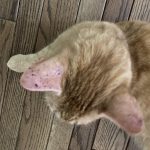Hello,
I am anti grain free too. I have seen perfectly healthy dogs die, in some cases even multiple dogs in the same house die from grain free diets and heart disease. It has changed me and I won’t recommend grain free until we know exactly what is happening and why. Along with what we can do about it. For now I don’t feed or recomend grain free. I also do not believe the anal glands are associated with the diet. I’ve seen thousands of dogs over decades and they don’t correlate to diet and anal sac issues. Please don’t think that we lecture because we are influenced by anything other then our training, our individual experiences and our deep fondness for the animals we have dedicated our lives too. To say we are paid or influenced by the pet food companies Is both untrue and unkind. You should find a diet that works for all of you and is safe to feed. My best to you all. Be kind to your vet. They want what’s best for your dog.
Hi, while looking for information about my 15 yo beagle’s combination of symptoms, I came across IVDD and a youtube video about Hank by Dr. Krista Magnifico. Several years ago, my beagle started having short tremors that would last a few seconds. Those are fairly common now, occurring multiple times an hour. Last year, she became incontinent at night, and leaked sometimes during the day. She is on Proin for that, and it has mostly stopped that issue. And in the last few months, her legs have started giving out from time to time. She doesn’t seem to act like she’s in pain, though she pants a lot, but always has, especially in the evenings. I have some short videos showing the tremors and her legs giving out, and I can provide you a link to Google photos if Dr. Magnifico would view them and let us know if it looks like IVDD or not. Thanks!
Comments
I have a question about dog food. Years ago, we had a german shepherd who was allergic to chicken. We switched him (and our other 2 dogs) to grain free and they all did amazing on it. We mixed proteins and had no issues. Now, years later, we have a german shepherd pup (9 months old now). When he came to us at 8 weeks he was eating Victor grain free active dog and puppy. Our vet is anti-grain free and recommended Purina Pro Plan large breed puppy (chicken). We transitioned over a couple of weeks, but he had soft stools or diarrhea all the time and was itchy. He ended up having anal gland issues. We added pumpkin, bananas, yogurt and nothing helped.
We switched to the sslmon/sensitive skin and stomach puppy formula but it didn’t get better. We ended up adding Victor back in, and he got better. Now he is back on the Victor puppy grain free, mixed with the Victor grain included formula. No issues. But our Vet has us worried about heart issues, and I’m worried that we’re going to get a lecture because she only recommends Purina Pro Plan, Science Diet, RC, Ian’s – big companies with a vet on staff. Should we keep trying these, or stick with what’s working? (Our previous vet retired 🙁 ) We want to do the best thing for our puppy.
Comments
My brother has a bulldog and is telling me that the dog is having trouble standing. He dosent eat or drink. When he tries to get up he walks for a few minutes then collapses. He also pants all day. Is there any thing we could do or does anyone know what it is. There isn’t a local vet where he lives but he will take her if that’s the only option.
Comments
11 month old puppy has welts/hives/bumps all over her body and legs.. not sure if it’s from something she ate, bees, allergic reaction to some type of plant? She’s acting pretty normal otherwise, just looks terrible! Her vet doesn’t have any appointments available for 10 days. He did say to give her Benadryl, which she has had two doses of and doesn’t seem to be helping much. When should I worry and consider taking her to an emergency vet clinic?
Comments
Scooter, my cat for over 21 years slept by my chest every night. He became sick earlier this year and had to be euthanized. Within days of losing him one of my other cats has decided to do everything in her power to keep me up at night. She will knock things over, turn off my cpap machine, etc. until I finally give in and get up and go downstairs with her. I usually will do stuff on the computer or straighten up. She usually just sits by me and after about 2 hours I can go back up to bed followed by her for about 5 or 6 hours. She is healthy, playful, friendly. Lately she has gotten worse and wants to be up more often. Tried locking her out of our room but she has clawed the carpet and the door. I cannot lock her in another room because she will do the same thing. I have been so exhausted that on a few occasions I have put her in the carrier for a few hours so I can get some sleep. She goes in willingly and makes bo noise while she is in there. I have tried to keep her up several hours before going to bed but nothing works.
Any suggestions. Oh she is about 10 years old. One odd thing is that if one of my other cats is sleeping with me which is rare, she will not bother me.
Thank you
Comments
Anyone know whether half a Xyzal tablet would be okay to give a kitty? (My spouse says “It’s the same as Zyrtec minus one stereo isomer,” whatever that means.) We currently give him half a Zyrtec when he gets super itchy, and it helps. Reason we are wondering is we have a huge bottle of Xyzal but no more Zyrtec.
He is treated monthly for fleas, does not go outside, and we’ve tried every way we can think of to help him other than meds. But sometimes he still scratches so much he makes his ears bleed, poor guy. The meds help him a lot.
Comments
Hi Christine Remines here. Sampson’s ears were bothering him so we cleaned them. They were dry and itchy so I put some dog nose moisturizer on them. Now they are swollen like they may have hematoma. Emergency vets on your answering machine … one has an 8-9 hour wait and the other isn’t seeing patients what should I do?
Comments
Hello!! I found Dr Krista’s YT vid (Stripes the cat re nasal polyps) while researching my kitty’s condition. I have had Percy out to Pet ER w. initial thick mucus that became tinged w. a bit of blood. He was prescribed Doxy to treat the infection… it wasn’t until during the course of treatment that he began the “snoring” at which point I rushed him back to Pet ER. Having limited funds and no experience w. these issues ever before, I opted for Labs (figuring that would be a start). Unfortunately, the results did not “tell me anything unusual” and I am not a vet. It was then that I learned about these polyps … and I feel confident that this could be what Percy is suffering from (unless there may be a foreign object obstructing his airway). At this point I have no dx!! I’ve been on the veterinary roller-coaster ride trying to determine the best course of action between my local vet (Dundalk Animal Hosp), Pet ER or another vet altogether… at this point not knowing the cause of his breathing issue or how much the costs may be… I guess I can understand why “estimates” can’t be given … I am just trying to determine the LESS COSTLY route and there seems to be no clear answer. My head is spinning and I want the best for Percy and to NOT have to lose him, that’s the bottom line… my heart is hurting as this was so unexpected!! Would it be possible to fit Percy into the clinic’s busy schedule ASAP?? I called this morning and was told that Monday is already full. Emily advised to reach out on Pawbly … I also sent a pm on FB.
I really need help, I cared for 2 cats last year both former strays, one Main Coon mix w. Hypercardiomyopathy and the other cancer of his paw which was eating away. Both these babies tore my heart in 2 but I did what I had to until it was time to journey on RIP… we had a family of 6 at that time along w. my deceased uncle’s dog. My Care Credit card was easily almost maxed out… my boys and I are pitching in together as many ways as possible for Percy. He is the last of our most recent feline family and I do NOT EVER want to stop caring for animals!! Thank you for my restored faith in humanity!! ~Love~ Shelley & Percy
Comments
My cat died outside the house with blood in her mouth. And I touched and look for any marks or injuries. There’s no mark she was hit by a car, or someone hit her. And she is not going to any other house. Please, someone, say it’s a natural cause. I was thinking about this whole day. I’m stressed because of this. I worried that someone did something to her. She lived with us for 13 years.
A few days ago she couldn’t eat and vomited time by time. So we took her to the vet, and they gave saline and a few injections. She was fine after that.
The only thing that happened is before she died, she sneezed continuously at night and morning when she is sleeping with me.
I can try to make up my mind if this is due to natural causes.
Comments
I have an 8 year old English bulldog that has to have 2 teeth in his upper jaw extracted. Are you able to give me an estimate as to how much it would be?












Hello,
This is a diagnosis that needs to be provided by an inperson examination. In some cases an X-ray can help and in others a CT is needed. Please don’t diagnose without a vet doing an exam on your dog.